RELATED:Work sanctions could hinder Netanyahu on Washington trip Yacov Livne, one of the heads of the committee, said the expectation was that the directive would be followed by all ministry employees, including Ambassador to the US Michael Oren.Oren, according to sources in Washington, is expected, nevertheless, to accompany Netanyahu to his meetings. The sources pointed out that Oren, while drawing his salary from the Foreign Ministry, was a political appointee sent to Washington by Netanyahu. While he has expressed understanding for the workers in his embassy, he also owes his job to Netanyahu and remains loyal to him.At the end of last week, Netanyahu asked the IDF’s procurement delegation in Washington – a delegation almost as large as the Foreign Ministry’s delegation in the embassy – to help with the logistics of Netanyahu’s visit to begin direct talks with the Palestinian Authority. The prime minister is scheduled to leave Tuesday for Washington.On Sunday, the workers committee sent a letter to Chief of General Staff Lt.- Gen. Gabi Ashkenazi stating that breaking the strike by a government security body is an improper norm “that does not belong in a law-abiding country. It is unnecessary for us to say that we will not allow such an aggressive act to pass quietly.”The letter alluded to sanctions the ministry has taken against the Mossad – it stopped cooperating with that institution because Mossad representatives provided support for Netanyahu’s visit to Greece earlier this month – and said the workers committee hoped it would not have to take similar steps against IDF representatives.“Therefore,” the letter read, “we ask that you direct all IDF representatives to stop actions involved in breaking the sanctions of the Foreign Ministry employees.”The IDF Spokesman’s Office released a statement denying that Ashkenazi had ordered military attachés to assist in coordinating the prime minister’s visits overseas due to the Foreign Ministry sanctions.“Such statements are complete nonsense,” the IDF said, adding that the ministry letter had by Sunday evening not yet arrived at Ashkenazi’s office.A senior official in the Prime Minister’s Office said that the work sanctions were an inconvenience, and will make the prime minister’s trip more complicated.“The embassy is the eyes and ears of the government, and provides important logistical infrastructure,” the official said.Livne said that while Histadrut head Ofer Eini intervened with the Foreign Ministry to get the workers to service Netanyahu’s trip to Washington in July, this time no such intervention was forthcoming.He said that had Netanyahu himself intervened and said he would intimately involve himself in the issue, then the boycott of his trip by the ministry workers would probably have been put on hold. But, Livne said, Netanyahu made no such overture.The ministry’s diplomatic workers have imposed various degrees of sanctions since February.
Yaakov Katz contributed to this report.
